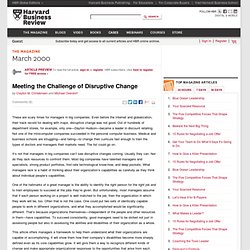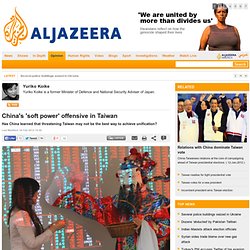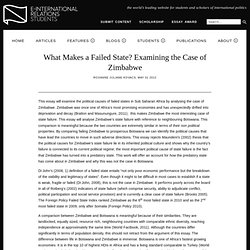

Leaders: The world of Barack and Xi. Meeting the Challenge of Disruptive Change. These are scary times for managers in big companies.

Even before the Internet and globalization, their track record for dealing with major, disruptive change was not good. Out of hundreds of department stores, for example, only one—Dayton Hudson—became a leader in discount retailing. Not one of the minicomputer companies succeeded in the personal computer business. Medical and business schools are struggling—and failing—to change their curricula fast enough to train the types of doctors and managers their markets need.
The list could go on. It’s not that managers in big companies can’t see disruptive changes coming. One of the hallmarks of a great manager is the ability to identify the right person for the right job and to train employees to succeed at the jobs they’re given. This article offers managers a framework to help them understand what their organizations are capable of accomplishing.
Where Capabilities Reside Resources. When they ask the question, “What can this company do?” Textbooks round the world: It ain’t necessarily so. Inequality and the world economy: True Progressivism. Sustainability: ‘Only business can effect needed transformation’ The next crisis: Sponging boomers. Happiness and Hazelnuts - Forbes.com. Lions on the Move - By Susan Lund and Arend Van Wamelen. Africa is no longer the "lost continent" of popular imagination.

The region has been growing rapidly for over a decade, the private sector is expanding, and a new class of consumers is wielding considerable spending power. And because of its young and growing population, the sky is the limit for future growth: Between 2010 and 2020, the continent is set to add 122 million people to its labor force. An expansion of this magnitude should set the stage for dynamic growth, but capturing this potential will require a change in economic development strategy.
At its current pace, Africa is not generating wage-paying jobs rapidly enough to absorb its massive labor force, which will be the largest in the world by 2035. Across Africa's diverse mosaic of countries, the challenge is the same: to create the kind of jobs that will ensure continued prosperity and stability for its citizens and enable Africa to become a major player in the world economy. 1.
Poverty is also on the retreat. 2. China's 'soft power' offensive in Taiwan. Tokyo, Japan - China's behaviour during the recent presidential election in Taiwan demonstrates that its leaders have learned some lessons, if only the hard way.

They have learned that China can have a greater impact on Taiwanese voters through trade and making people feel richer than by threats - even threats to fire missiles - which had been China's electoral tactics in previous Taiwanese elections, particularly when a pro-independence candidate looked popular enough to win. Indeed, fearing the popularity of Lee Teng-hui, who ran in the 1996 presidential election on a pro-independence platform, China's People's Liberation Army actually fired missiles close to the nearby coast of Keelung.
But this sabre rattling backfired. Lee won. The presidential election on January 14 was the first of the transfers of power in China and Taiwan that will take place this year. Instead, China did all that it could do boost Ma, who has presided over a massive increase in economic ties with the mainland. What Makes a Failed State? Examining the Case of Zimbabwe. This essay will examine the political causes of failed states in Sub Saharan Africa by analysing the case of Zimbabwe.

Zimbabwe was once one of Africa’s most promising economies and has unexpectedly drifted into deprivation and decay (Bratton and Masunungure, 2011); this makes Zimbabwe the most interesting case of state failure. This essay will analyse Zimbabwe’s state failure with reference to neighbouring Botswana. This comparison is meaningful because the two countries are extremely similar in terms of their non political properties. By comparing failing Zimbabwe to prosperous Botswana we can identify the political causes that have lead the countries to move in such adverse directions.
Di John’s (2008, 1) definition of a failed state entails “not only poor economic performance but the breakdown of the viability and legitimacy of states”. A comparison between Zimbabwe and Botswana is meaningful because of their similarities. Maundeni’s thesis can, however, only be partially true. Destroying the commons. Down the road only a few generations, the millennium of the Magna Carta, one of the great events in the establishment of civil and human rights, will arrive.

Whether it will be celebrated, mourned, or ignored is not at all clear. That should be a matter of serious immediate concern. What we do right now, or fail to do, will determine what kind of world will greet that event. It is not an attractive prospect if present tendencies persist - not least, because the Great Charter is being shredded before our eyes. The first scholarly edition of Magna Carta was published by the eminent jurist William Blackstone.
Blackstone's edition actually includes two charters. Asian welfare states: New cradles to graves.